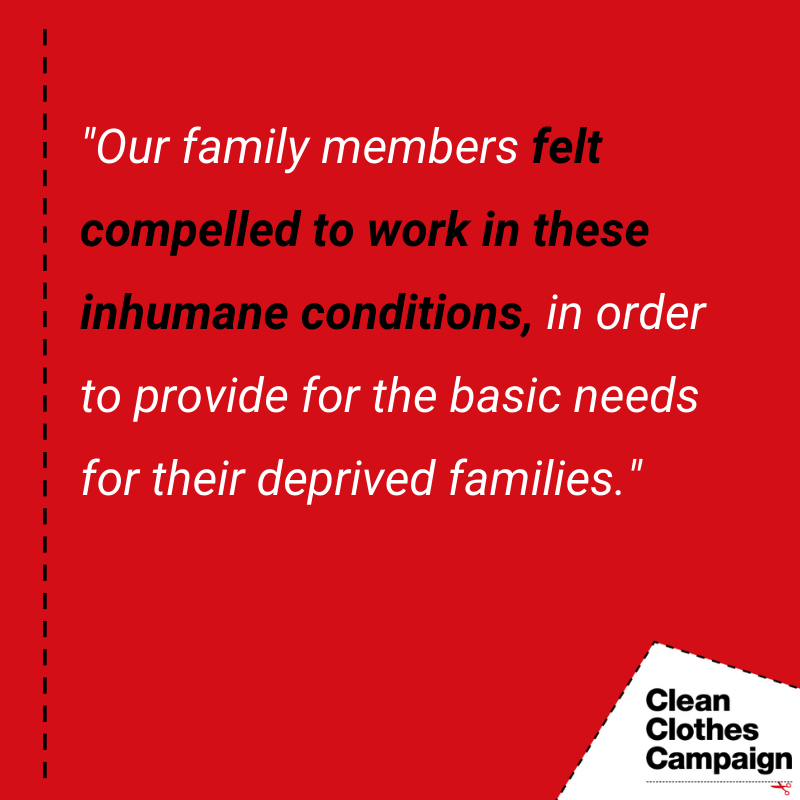
Families of 28 drowned workers in Morocco call for urgent support
On February 8th 2021 nineteen women and nine men between the ages of twenty and forty died in a garment factory in Tangiers, Morocco, after a short circuit caused by the heavy rains in the region flooded many places and houses at street level. The families of the workers call on the Moroccon state for urgent support.
This tragedy shows the urgent need for better working conditions in the Moroccan garment industry, as well as an international binding agreement on factory safety that holds brands, retailers and factory owners accountable for creating safe and healthy workplace conditions.
We, the families of the workers who were victims of the "Tangier Tragedy", gathered on the fortieth day following this tragedy, which was denounced by public and international opinion.
We want an end to the tragic conditions that occurred in this industrial unit which for many years had employed around 150 workers, without respect for health and safety measures. Our relatives felt compelled to work in these inhuman conditions, in order to provide for the basic needs for their deprived families. This work has cost them their lives today, and the 'Tangier Tragedy' deprived us of our children as well as our source of living.
Forty days have passed, and neither the state nor the responsible institutions have provided moral or material support to us.
Accordingly, we claim the following from the responsible authorities:
- We demand an independent committee is formed to investigate the circumstances of this tragedy and identify those responsible for it and hold them accountable.
- We request to provide urgent financial support to the families of the victims.
- We request to provide medical and psychological support for the families of the victims.
- We demand to provide social security and health coverage as a right for the families of the victims.
- We demand the authorities to return the victims' personal belongings which were lost during the accident.
We also kindly ask the international civil society to provide solidarity and support to us, the families of the victims.
Hicham Ben Ayad - Uncle of the victim Aicha Ben Ayad
Meryam Tawfik – Family of the victim Ahmed Tawfik
Abdessalam Znagui – Father of the victim Yousra Znagui
Mohamed Amjar – Father of the victims Fatima-Zohra and Sanae Amjar
Mohamed El Ghalich – Brother of the victim Soukaina El ghalich
Omar Allach - Family of the victim Oubaida Allach
Abdessalam Bourkiba – Father of the victim Ghizlan Bourkiba
Ibrahim EL Hamioui – Brother of the victim Oussama Hamioui
Fakhita Dildi – Aunt of the victim Saloua El khoulti
Zineb El Halouti – Sister of the victim Rachida el Halouti
Najwa El Hayani - Widow of the victim Mohamed CHERIF
Abdelilah Cherif - Cousin of the victim Yassin CHERIF
Kawtar LANJRI HOMRANI mrani Nejri – Widow of the victim Mohamed Sbia
Badia Belkhir – Mother of the four victims Hassania, Chaima, Fatima et Amal Belkhir
Anas Derbaoui – Brother of the victim Mouad Derbaoui
Assia El bouhssini – Mother of the victim Fatima Jaghdal
Abdelatif El Afia – Father of the victim Mohamed El Afia
Abdelbaki El khoumssi – Father of the victim Oumaima El Khoumsi
The Rana Plaza collapse
24 April marks eight years since the Rana Plaza building collapsed with thousands of people inside, killing at least 1,134 people. Every year, this is a moment of reflection for the stakeholders of the garment industry, as well as an important time of commemoration for all those affected by this tragedy. The collapse was an important eye-opener for the industry, which became a major driver for change in the field of workplace safety.
Bangladesh Accord and the need for an international binding agreement
The Accord on Fire and Building Safety in Bangladesh was signed weeks after the collapse as a binding safety programme, out of the realisation that the voluntary programmes of the past had failed to prevent the tragedy. The Bangladesh Accord was signed by over 200 brands, and since its inception has made over 1600 factories safer for 2 million workers. The binding contract, which has been critical to the programme’s success and brands’ compliance, is currently slated to end on 31 May. No brand or retailer has thus far committed to sign a new programme that is legally binding upon member brands. Instead, brands are proposing watered down versions of the programme that carry a very real risk that workplace safety in Bangladesh would backslide to pre-Rana Plaza levels. Recent factory incidents in Morocco, Egypt and Pakistan have shown that it is high time to expand the successful model of the Bangladesh Accord to other countries, instead of weakening its effectiveness in Bangladesh. That is why unions and labour activists call for a new binding agreement on factory safety to be put in place as soon as possible.